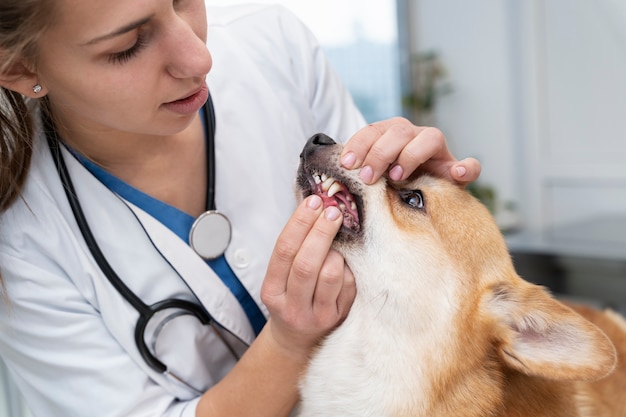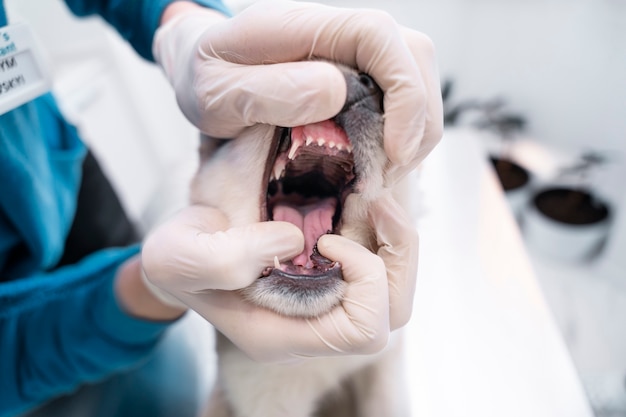Recognizing Signs of Oral Tumors in Pets Early


Recognizing Signs of Oral Tumors in Pets Early
Oral health is a crucial part of your pet’s overall wellbeing, yet oral tumors in dogs and cats often go unnoticed until they cause serious problems. As a pet owner in Coral Springs and surrounding communities, you want the best for your companion, which means being able to recognize subtle changes that could indicate a developing health concern. At Florida Veterinary Dental Services, located at 4101 Turtle Creek Drive, Coral Springs, FL 33067, our team of veterinary dental specialists is dedicated to helping local pet owners understand the early warning signs of oral tumors and the importance of prompt, expert evaluation.
This blog will guide you through the common and subtle signs of oral tumors in pets, explore what causes these growths, and explain how a referral to a veterinary dental specialist in Deerfield Beach can make all the difference. You will also learn about advanced diagnostic and treatment options available at our specialty center, including how imaging and surgical expertise can improve outcomes. As a referral-based specialty practice, we work closely with your general veterinarian to provide advanced care for complex dental and oral conditions. If you are searching for a "specialty vet near me" for oral tumor concerns or advanced dental care in Coral Springs, you are in the right place.
Recognizing the Signs of Oral Tumors in Pets
Understanding the early symptoms of oral tumors in pets is essential for timely intervention. Oral tumors can be challenging to detect in the beginning, as many pets hide discomfort or show only subtle changes. However, being attentive to your pet’s daily habits and oral health can help you spot the warning signs early.
Common Symptoms You Might Notice
Key symptoms of oral tumors in pets include persistent bad breath that does not improve with routine dental care, visible masses or swellings in the mouth, and unexplained bleeding from the gums or oral cavity. Other signs to watch for are drooling that is thicker or more frequent than usual, difficulty eating or picking up food, and noticeable weight loss over time. Sometimes, pets will drop food from their mouths, chew only on one side, or paw at their faces as if something is causing discomfort. You may also observe loose teeth that do not seem related to age, or areas of discoloration or ulceration in the mouth.
Additionally, oral tumors can sometimes cause facial swelling, nasal discharge, or changes in the appearance of the jaw. These symptoms may develop gradually, so it is important to perform regular checks of your pet’s mouth, especially if they are in their senior years or have a history of oral health concerns. If you notice any of these symptoms or changes in your pet’s behavior, it is important to contact a veterinary dental specialist in Deerfield Beach as soon as possible.
Subtle Behavioral Changes
Beyond physical symptoms, subtle shifts in your pet’s behavior can also signal something is wrong. Pets may become withdrawn, less playful, or reluctant to allow their mouths to be touched. A once-friendly dog or cat may start to avoid chew toys or hard treats, or they might groom less frequently because of mouth pain. It is important not to dismiss these changes as simply “getting older”; they can be a sign of a developing oral tumor and should prompt a visit to your family veterinarian, who may refer you to our specialty team for further evaluation.
What Causes Oral Tumors in Pets?
Oral tumors in pets arise from a variety of factors, and understanding these causes can help you be proactive about your pet’s health. Tumors may develop from abnormal cell growth within the gums, jawbone, tongue, or surrounding tissues. Some oral tumors are benign, meaning they do not spread, while others are malignant and have the potential to invade surrounding tissues or metastasize to other parts of the body.
Risk Factors and Prevalence
Several risk factors can contribute to the development of oral tumors in dogs and cats. Age is a significant factor; older pets are more likely to develop tumors, although they can occur at any stage of life. Certain breeds may be predisposed to specific types of oral cancers, and environmental factors such as exposure to tobacco smoke or chronic inflammation in the mouth may also play a role. Periodontal disease, which is prevalent in pets without regular dental care, can create an environment where abnormal cell growth is more likely.
The climate in Coral Springs and South Florida does not directly cause oral tumors, but pets living in warm, humid environments may experience faster progression of oral infections, which can complicate existing oral health issues. Early detection is crucial, which is why regular dental wellness exams are highly recommended.
Importance of Early Diagnosis
The sooner an oral tumor is diagnosed, the better the chances of successful treatment. Many oral tumors grow slowly at first, making them difficult to distinguish from benign growths or routine dental problems. Advanced imaging and diagnostic tools, such as intra-oral dental radiology and on-site CT scans, enable our veterinary dental specialists to accurately assess the extent and nature of oral masses. If you are searching for "oral tumor diagnosis in Coral Springs" or "pet dental imaging near me," our center offers the expertise and technology needed for comprehensive evaluation.
How Veterinary Dental Specialists Treat Oral Tumors
Treatment for oral tumors in pets requires a specialized approach that balances your pet’s comfort, quality of life, and long-term health. As a dedicated veterinary dental specialist in Deerfield Beach, our practice focuses exclusively on dental and oral surgery services, including the diagnosis and management of oral tumors.
Diagnostic Process and Imaging
When your pet is referred to our practice, the first step involves a thorough oral examination under sedation or anesthesia to ensure your pet’s comfort and safety. We utilize advanced imaging techniques such as intra-oral dental radiology and CT scans to visualize the tumor’s size, location, and possible invasion into surrounding bone or tissue. This information is essential for planning the most effective treatment strategy and ensuring precise surgical intervention when needed.
Surgical and Oncologic Treatment Options
Surgical removal is often the primary treatment for many types of oral tumors. Our oral and facial tumor surgery service provides comprehensive care, from biopsy and diagnosis through to advanced oral and maxillofacial surgery. Some tumors may require reconstructive procedures or additional therapies, depending on their size, location, and whether they are benign or malignant. For malignant tumors, our team can provide oral oncology surgery and collaborate with your primary veterinarian and veterinary oncologists as needed.
Pain management and supportive care are integral to every treatment plan. Our specialists use advanced oral pain management techniques and work closely with pet owners to ensure their companion’s comfort throughout the process. If you are seeking a "dental specialist vet near me" for surgical or oncologic care, our practice is equipped with the latest technology and expertise to provide the highest standard of care.
What to Expect During Treatment
Each case is unique, and treatment options will be discussed in detail following a full diagnostic evaluation. The process may involve pre-surgical examinations, advanced imaging, surgical intervention, and follow-up care. Our veterinary team will communicate closely with your referring veterinarian and provide detailed recommendations for at-home monitoring and post-operative care. Throughout your pet’s treatment journey, you can expect compassionate support and clear guidance every step of the way.
Preventing Oral Tumors and Supporting Your Pet’s Oral Health
While not all oral tumors can be prevented, proactive oral health care can reduce your pet’s risk and support early detection. Regular wellness examinations and thorough at-home monitoring are essential components of preventive care.
Steps for Prevention and Early Detection
Routine dental cleanings and wellness exams by your family veterinarian are the foundation of good oral health. These appointments allow for the early detection of abnormalities, including masses or lesions that may not be visible during a brief look at home. Brushing your pet’s teeth regularly and providing dental-friendly diets or treats can help reduce chronic inflammation and lower the risk of periodontal disease, which is a contributing factor for some oral tumors.
Checking your pet’s mouth at home on a weekly basis can help you spot changes in the gums, teeth, or oral tissues. Look for redness, swelling, ulcers, or any unusual growths. If your pet resists having their mouth examined or seems sensitive to touch, this may signal pain or discomfort that warrants professional attention.
The Role of Specialty Dental Care
If your general veterinarian identifies a concern or you notice persistent symptoms, referral to a veterinary dental specialist ensures your pet receives a comprehensive diagnostic workup and access to advanced treatment options. Specialty dental services in Coral Springs, such as those provided at Florida Veterinary Dental Services, are uniquely equipped to address complex oral health issues and provide the highest level of care.
When to Seek Veterinary Care for Oral Tumors
Knowing when to seek professional help can make a significant difference in your pet’s prognosis. Immediate veterinary attention is needed if you observe rapid swelling in the mouth or face, bleeding that does not stop, or sudden changes in eating or drinking behavior. Persistent bad breath, drooling, or unexplained facial pain should also prompt a veterinary visit.
Referral to a Veterinary Dental Specialist
If your family veterinarian suspects an oral tumor or refers you for advanced care, it is important to schedule a consultation with a veterinary dental specialist in Deerfield Beach as soon as possible. Early assessment and intervention can improve treatment outcomes and provide peace of mind for you and your pet. Specialty dental care teams, like ours at Florida Veterinary Dental Services, work in close collaboration with your regular veterinarian to ensure the best possible care every step of the way.
If you are searching for an "oral tumor specialist vet near me" or "veterinary dental specialist near me," our location at 4101 Turtle Creek Drive, Coral Springs, FL 33067 is easily accessible for pet owners throughout Coral Springs and the surrounding areas. We welcome referrals for comprehensive diagnosis and treatment of oral tumors in pets.
Supporting Your Pet’s Oral Health: Take Action Today
Early recognition and intervention are the keys to successfully managing oral tumors in pets. By understanding the signs of oral tumors in pets, taking preventive steps at home, and partnering with your family veterinarian and a trusted veterinary dental specialist in Deerfield Beach, you are giving your companion the best chance for a healthy, happy life. If you notice any unusual symptoms or have concerns about your pet’s oral health, do not wait—speak with your regular veterinarian about a referral or contact our team directly.
Our veterinary dental specialists are committed to providing advanced care, compassionate support, and clear communication throughout your pet’s treatment journey. For more information about our diagnostic imaging, surgical, and oncology services, visit our oral and facial tumor surgery page or learn about our intra-oral dental radiology capabilities. To schedule a consultation or for questions about specialty dental services in Coral Springs, call us at (954) 396-9660 or visit us at 4101 Turtle Creek Drive, Coral Springs, FL 33067.
When it comes to your pet’s health, you deserve a "specialty vet near me" who provides expert, compassionate care. The team at Florida Veterinary Dental Services is here for you and your pet, offering leading-edge oral tumor diagnosis and treatment in Coral Springs and the surrounding communities. If you have any questions or wish to discuss your pet’s oral health, reach out today—we are here to help every step of the way.
Information provided in this article is for educational purposes only and should not be used as a substitute for professional veterinary advice. Always consult your family veterinarian or a veterinary dental specialist for concerns about your pet’s health.



















